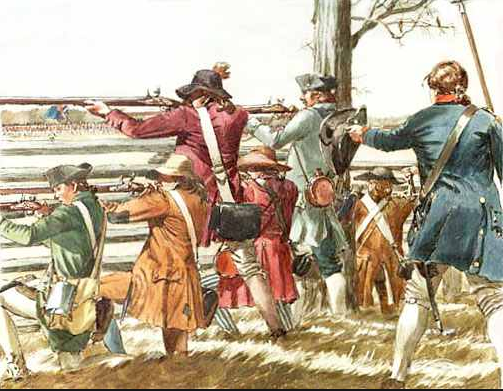An 1830 law created pensions for veterans of the Revolutionary War. (Think about it--the surviving veterans would have been about 75 years old by then.) Joseph Abbott, a 4 x great-grandfather of the Moore brothers, was granted a pension of $20.31 per year beginning March 4, 1831. Upon his death 20 months later, his widow applied for a continuation of the pension but was rejected because their marriage was found to have occurred after his service. Later the law was changed and she eventually received the pension. Apparently, giving a hard time to the Vets is a long tradition in the U.S.
Joseph’s father had been a Lieutenant in the French and Indian War. Furthermore, his fiancee’s brother, John Buckman, was the owner of Buckman’s Tavern, the unofficial headquarters of Lexington's rebellious locals. Joseph and his brother Nehemiah joined the militia of Lincoln, a town adjacent to Lexington.
In early 1775, as resistance to colonial rule increased in Massachusetts, the British had lost control of the countryside. In February, the British declared Massachusetts to be in a state of rebellion. British General Thomas Gage hoped to avoid war by staging small raids to seize rebel weaponry. On the night of April 18-19, Lt. Col. Francis Smith and 700 British regulars set out for Concord, about 25 miles away, to seize a rumored cache of arms.
Rebel spies had provided advance warning of the raid. The spies had also intercepted instructions from London that Gage was to capture and imprison rebel leaders. Although seizing the leaders was not a purpose of this raid, some clumsy inquiries by scouting parties convinced the rebels that Smith intended to arrest Samuel Adams and John Hancock, then sheltering in Lexington.
The alarm went out and the militia of Lexington hastily assembled to demonstrate their resolve. At roughly 2:00 am on April 19, the vanguard of the British forces met the militia unit of Capt. John Parker on the Lexington Commons. Visibility was poor, both sides were unsure of the intentions of the other, and both forces acted in an undisciplined manner. A shot came from somewhere and the melee began. One British soldier was wounded, but eight Americans fell dead and ten were wounded.
The British continued their advance to Concord. After fighting another skirmish, they found no arms there. The rebels had used their warning time to relocate the weapons, burying some in the furrows of newly plowed fields. It was time for the exhausted redcoats to return to Boston, but the road back went through Lexington.
By the time the British returned to Lexington, militia units from the area had joined, including the Lincoln militia and the Abbott brothers. The rebel force now totaled perhaps 2000 and eventually grew to 4000. Using ambush tactics, firing from behind trees and stone walls, the rebels harassed the British for the hours-long retreat to Boston, killing perhaps 80 British soldiers.
By the next day, Boston was surrounded by 15,000 militia from all parts of New England. The British raid had triggered the war that it was intended to prevent.
Later, Sergeant Joseph Abbott served in the fortification of Dorchester Heights that forced the liberation of Boston, and in the defense of Fort Ticonderoga before mustering out in Albany, New York at the end of 1776.
